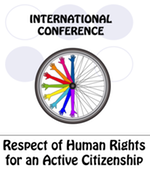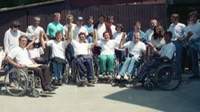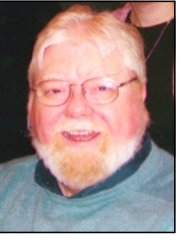Ladies and gentlemen, Members of Parliament, it is an honor for me to be here, to express myself and to talk with you about the implementation of an essential Treaty - the Convention on the Rights of Persons with Disabilities. Before I start, I would like to give you some details, two or three, that will become evident during my speech.
I have a great deal of experience and what is special about my experience, is that before I became disabled I was somebody who actually already represented disabled people. So I was defending the rights of disabled people before I had to defend my own rights as a disabled person. That gave me another way of looking at things. And, what I drew from this experience was that as a professional without a disability, I knew absolutely nothing about the reality of life of the people with disabilities that I was already supporting. I discovered that there is a huge difference between the reality I knew as a non-disabled professional and the reality I got to know as a disabled person myself. Since then I have been working hard as an activist to try and bring these two areas together. So that is one of my personal experiences.
The second experience, which struck me particularly, came about after two years of speaking about disability when I coordinated the preparation and the realization of the European Year of Disabled people in 2002-03. I realized that the term “disability” itself is the origin of a lot of misunderstandings. In French we talk about ‘handicap” and in English we talk about “disability”, but even if these two words have a different meaning in their respective native culture, I think in fact that the origin of the term is irrelevant. The misunderstanding is really linked with the image of disability that you have. Handicap in French brings a negative image to people’s minds, and they automatically think of deficiency, incapacity, or disadvantage. They never think of anything positive. So if you want to talk about it in a neutral way, you must avoid the term. So I have decided to scrap handicap - which is quite positive but gives rise to negative images - from my vocabulary. I would like to suggest that you try something that works, yet costs nothing to do. It is an exercise, an exercise of forcing oneself to look at things differently, to perceive things differently by using a different vocabulary. It is an exercise I have carried out in the past. All it requires is a daily effort with regard to your vocabulary. It is a wonderful training - or learning experience. It is something that is essential when we are working in this area if we want to help change people’s attitudes towards disabled people. And if we are to change people's attitudes, we have to change our own first. We must think and behave differently. And this exercise helps us do this. I promise you it works.
Over the last 30 or 40 years, leaders in the disability rights movement have become well aware of disability and disability issues. We were fighting for the rights of disabled people; and with the entry into force of the international Convention at the beginning of the 21st century, the world has finally become aware that part of its population does not have access to their fundamental rights as human beings. What has been recognized as belonging to every single person did not apply for certain people. Human rights were not applied for people who have different capacities, or to use the World Health Organization’s vocabulary - people who have certain restrictions. Some realized that society was discriminating against those people, and eventually the Convention was born. And, as society has taken a long time to recognize this discrimination, it will take a long time to implement the changes needed. We will have to persevere. We will have to be pragmatic. And we will have to rationalize and encourage the rights, the fundamental human rights of every single person - whatever their capacity.
Today we no longer talk about fighting for our rights. Now we have them elaborated in the new Convention. The task now is to ensure that these rights are implemented. Now the roles of disabled people’s organizations are changing. We no longer have the same objectives. We are no longer talking about recognition. We are now talking about education - not about fighting. States parties are now aware of our rights, and our presence here proves that. But States are now faced with a new challenge. They have to implement the Convention so that everyone - whatever their capacity - is included. Now, a new quality must be developed among States – the quality of modesty (humbleness), the ability to say “we don't know how to do this”.
We are in a society that doesn't know how to live with disabled people and has to learn to do so. Because society generally does not have this experience, it has to start at the bottom, at square one. And who has this experience? The only people with the appropriate experience are the people who are living with these so-called restrictions of capacity and have learned how to stand up for themselves and exist in spite of these restrictions that exist in our society.
If people with different capacities find living together a strain on their lives, then we have to learn. We might not know how to live together, but we do know how to teach one another. And that is what we have to do in order to learn to live together. Everyone must understand our collective needs. I am not talking only about the needs of people with restrictions to their capacity, but of the needs of everyone. Implementation of the Convention involves society as a whole and should encourage the development of society as a whole. After all, we will all benefit from a stronger, more diverse and inclusive society. We, the representatives of organizations of people who are disabled, are convinced that one of the best resources for learning to live together as people with different capacities are people who themselves have disabilities.
We must ensure that the slogan, “nothing about us without us” becomes a reality. We must ensure that “participation” - at the moment only a word, a principle, an idea - becomes a reality; in other words that it be associated with objectives, criteria and financial resources. Earlier on in one of the first speeches someone said that we have to have finances available for participation; so it is a question of using public funding, and that is really the aim of our debate today. First of all, we have to define our objective; and the first step to doing this is participation. Participation has been clearly established with regard to the Convention, and disabled people and States have agreed to it. So, not only is the objective itself to ensure that the world in which we are living can allow everyone to participate, but the possibly single tool which will allow us to respect our objectives is participation. Without the participation of disabled people, States will spend a vast amount of money and possibly none achieve their goals. People with disabilities must be equal participants and collaborators as that is the only guarantee that things are done as correctly as possible. A policy of participation will allow us to better organize representation of disabled people so there is no more debate, no decision about the lives and needs of disabled people that takes place without disabled people.
A policy of participation would oblige us to work because at the moment there are too few disabled people in our debates. I have heard that in the UK, participation at that level is something that is understood and operational; and in other European countries decisions are made together so that it’s the first stage with regard to participation. We can only salute that; but now we have to go further. In other words, participation is not only making decisions; it is also making sure that those decisions become a reality. After all, when we have colleagues who are disabled, we should not only talk about legislation, but also of immediate understanding. Then, when a person is working with somebody who is disabled, he doesn't need to be educated to understand their rights. Instead, he will be able to take into consideration their needs, and will very quickly realize what can be done, either on his own or with guidance from the disabled person.
I would also like to ask something specific of the UK with regard to these restrictions - will the Convention be ratified 100% or will it only be ratified bit by bit?
I have heard mention of four reservations, and I think it is shocking for an activist with regard to human rights. You can't just have bits and pieces of legislation. You can't want to have just crumbs. You can't just say that rights are more valid in one area than in another. After all, the universal declaration has to be taken as a whole. We have learnt through our experiences that one never selects, never chooses disability. And I don't see why society should actually give itself the privilege of choosing the situations in which it wants or does not want to take disability into consideration when the people who are disabled can never make that choice themselves. So we are no longer talking about choosing. I will just give you an example, just an example - possibly to tease you a bit.
France has still not ratified the Convention. It says it wants to, and I believe France will do so, but I can't tell you with what reservations. France has just adopted a plan to include people who are disabled in the armed forces, but the UK is suggesting that that should be an area of exclusion. I must admit that the British people are possibly going to be badly looked upon by the intelligence services when people who can't hear properly are able to lip read and people who can't see well will understand certain subtleties in the tones of conversations they are listening to. So, you know what, Brits, you shouldn't be the ones firing last because the French may do better than you!
In all kinds of sectors, there are policies with regard to disabled people. We should have projects that are going to ensure a good quality of life for everyone, have measures that encourage the expression of all kinds of talents, whatever those talents are. Like Susan Boyle who has just enchanted the whole planet by the very simple sound of her voice, there could not have been a more wonderful message for the world. For a person who has learning difficulties because of a lack of oxygen at birth, Susan Boyle without even realizing it, has shown the world that behind the millions of so-called disabled people, there is talent that is often forgotten, often rejected, often invisible, often forbidden, that we don't want to see, but in fact, people who are absolutely capable of enchanting masses of people.
Can you realize what we are losing, the value that we are hiding from the world? I am sure that Susan Boyle hadn't thought about it, but tomorrow if she would - she could become our Ambassador; and I would like to in fact request her, amongst the millions of people that are hidden because of their restrictions, amongst the millions of potential talents and resources that I would like here and now for us to applaud, just as we applauded her as she sang, our contribution. Everybody should have the opportunity to get up and to rise up.
Thank you very much.
Jean-Luc Simon
Chair of the DPI European Region



 A new partnership for the future
A new partnership for the future